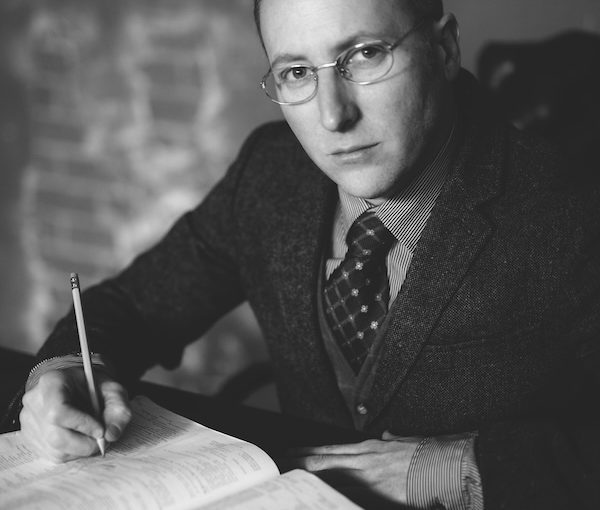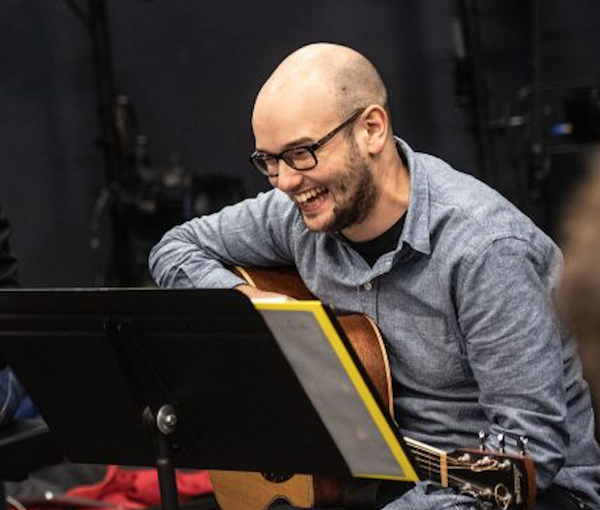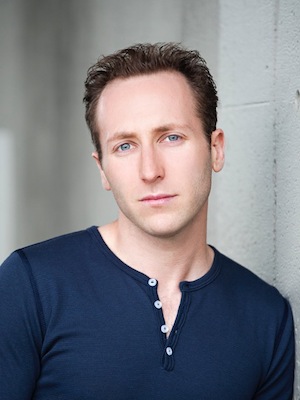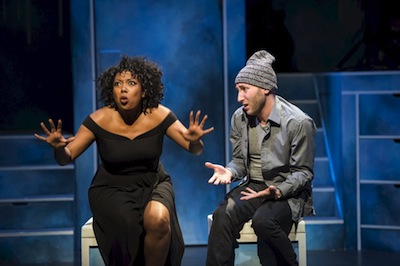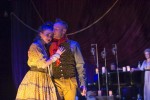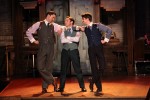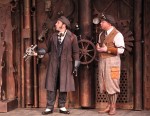Josh Epstein stars as Leo Frank in Raincity Theatre’s production of Parade, which runs until April 13. (photo by Nicol Spinola)
Raincity Theatre’s production of the musical Parade opened March 21 at 191 Alexander St., a heritage venue in Gastown. It runs until April 13.
The story of Leo Frank, who was kidnapped from the Georgia State Penitentiary by members of the Ku Klux Klan on Aug. 17, 1915, and lynched, might not seem the stuff of musicals. However, playwright Alfred Uhry and Broadway producer Hal Prince saw the potential of reaching new audiences with this important story that had already been told in novels, plays, film and television. With a book by Uhry and music and lyrics by Jason Robert Brown, the Prince-produced show opened on Broadway in 1998 – it won two Tony Awards. In 2023, Parade had a Broadway revival, again winning two Tonys.
Frank’s alleged crime was the rape and murder of a 13-year-old factory worker, Mary Phagan, but his real crime was being Jewish in the American South, which was, at the time, still feeling humiliation and anger over losing the Civil War.
Mary was last seen alive when she came to pick up her wages on the morning of April 26, 1913. Her body was found in the factory basement later that day. Frank was arrested and charged with the crime.
Several factors prevented a just trial, including a district attorney wanting a conviction to support his bid for governor, the antisemitism of a right-wing newspaper publisher, sloppy police work, the withholding of evidence, witness tampering, perjured testimony, and an all-white jury. This was America’s version of France’s Dreyfus Affair.
Frank’s wife, Lucille, lobbied everyone she could to intervene, and prominent newspapermen and others campaigned on Frank’s behalf. Finally, after two years in jail, Frank’s death sentence was reduced to life in prison, but the news was not welcomed by everyone. Mobs stormed the governor’s mansion and the National Guard was called out; martial law was declared. Frank was transferred into protective custody but the lynch mob – some of whom had been jurors in his trial – managed to kidnap and murder him.
“Our production will plunge our guests into the depths of human emotion, amidst the backdrop of a true historical event that still resonates today,” writes director Chris Adams in Raincity Theatre’s press material. “The passion and the tragedy of Leo and Lucille Frank’s story, enveloped in the haunting beauty of Jason Robert Brown’s score, will be simply unforgettable and I hope the undeniable resilience of the human spirit will deeply move audiences.”
Many Jewish community members are part of the show’s creative team, both on stage and off. Josh Epstein plays Frank. Warren Kimmel, Richard Newman, Stephen Aberle and Erin Aberle-Palm play various roles. Itai Erdal is the lighting designer, Michael Groberman the researcher and Kat Palmer, one of the producers. Rabbi Kylynn Cohen and Cantor Shani Cohen are consultants.
The Jewish Independent interviewed Epstein regarding his role.
JI: How did you get the part of Leo Frank?
JE: I was fortunate. I had it offered to me. I did not have to audition. I was asked to do this a year ago. I said yes immediately. Parade is my favourite piece of musical theatre. I am obsessed with it. I even went down to Seattle years ago to see it when the original Broadway cast toured it and got Jason Robert Brown’s autograph (my favourite composer) on the program, which I still have today. I remember just sitting there being gripped the entire show. The music is so gorgeous. However, it is not your typical Broadway production.
JI: The director said in an interview that you were born to play this part.
JE: I do feel like it is right for me. I have been waiting a long time to get a chance to play Frank and, when it was offered to me, I grabbed the opportunity. It was offered to me even before Oct. 7 and I knew it was an important role as, even then, there was a very antisemitic YouTube clip being circulated and, as a Jew, it was on the top of my mind with incidents happening and growing, and it is even more relevant today after Oct. 7.
JI: What research did you do to prepare for the role?
JE: I read what I could. The trial is a fascinating story that has everything in it, not just antisemitism but racism and women’s suffrage and children working in factories and people’s attitudes even 50 years after the Civil War is over. The parade was organized to honour the Confederate soldiers and then this explosion comes out of it with a resurgence of the KKK and the formation of the B’nai B’rith Anti-Defamation League. As far as the role goes, it is a deep acting role, but you also have to be able to sing. It has a lot of layers to it. I just read the script over and over to get some sense of the depth of Leo’s character.
JI: How would you classify the production?
JE: It is dark but there are moments of levity. It is the music that brings you joy. It will be an intense experience. It is such an incredible musical that you get swept away and it soaks into you. It is very visceral. People crave that. You won’t get that experience anywhere else.
JI: What can you tell us about the space and the cast?
JE: It is a gorgeous, intimate space with the audience close to the action and a really strong cast. The original production had a cast of 40. This one is pared down to 20. It is huge to have 20 people in a 70-seat space – it feels like a giant production yet there still is a sense of intimacy about it. Lucille is the real star in a way as she becomes the driving force behind Leo’s sentencing being reduced and the resurgence of their love.
JI: How has the experience of playing Frank been for you?
JE: This experience has been incredible. Sometimes, I can’t always speak about the experience but I feel it. When I am in the show, I trust it, the material is great. I don’t have to come up with any tricks or think of the next joke or push the drama, I just stay present in the scene and give my version of what Leo is going through.
JI: Why should people come and see it?
JE: People love true crime stories and it is one of the most interesting cases in history, still talked about today. The production takes everything interesting about the case and puts it to the most gorgeous music you will ever hear.
JI: What would you like to have the audience take away from the production?
JE: They don’t have to take any theatrical thing away. Just come and watch. The story is there. It is a true story. They should just come, watch and feel.
For more information and tickets, visit raincitytheatre.com.
Tova Kornfeld is a Vancouver freelance writer and lawyer.

